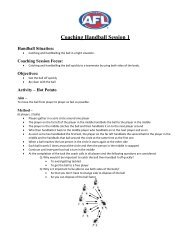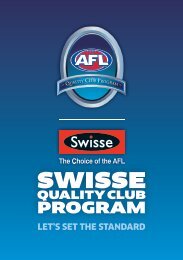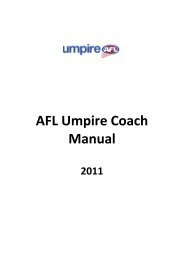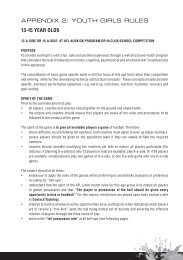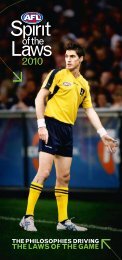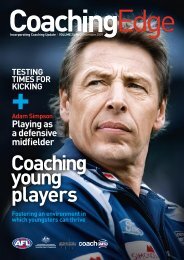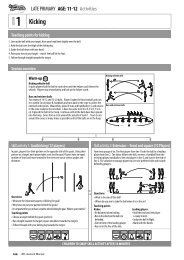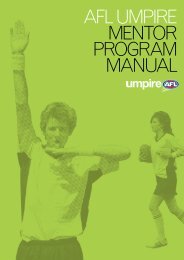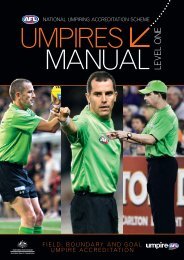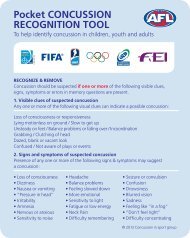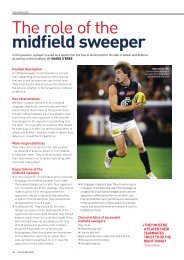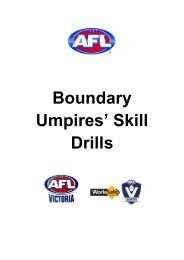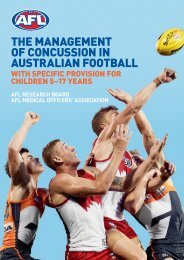2012 Youth Coaching Manual - AFL Community
2012 Youth Coaching Manual - AFL Community
2012 Youth Coaching Manual - AFL Community
Create successful ePaper yourself
Turn your PDF publications into a flip-book with our unique Google optimized e-Paper software.
Chapter 5<br />
Teaching and Improving Skills<br />
Introduction<br />
Fundamental skills form the basis for the development of all sporting skills. Many complex skills are made up of a<br />
coordinated sequence of fundamental skills (techniques) and the importance of these should not be underestimated. It is<br />
exciting to witness a champion displaying faultless techniques while performing in extremely competitive situations.<br />
Every player and coach strives to achieve ultimate game skill performance. However, the process of developing skills is long<br />
and detailed. It begins with a command of the basic, simple and complex skills and progresses through a mastery of mildly<br />
competitive situations to competence in full-scale competition.<br />
To achieve high-quality performance, players are encouraged to attend rigorously to each stage of skill development.<br />
Neglect at any stage of learning may result in the emergence of an exploitable weakness.<br />
Stages of learning<br />
From motor coordination to major game skills<br />
There are three identifiable stages of learning. Players will move through these stages at varying rates, and when new skills<br />
are introduced may regress from a later stage to an earlier stage. The coach’s responsibility is to carefully assess each player’s<br />
current stage and develop appropriate practices so that each player is motivated and challenged.<br />
Early stage<br />
Players in the early stage of learning a skill tend to make a large number of errors and may look and feel clumsy and<br />
uncoordinated. A player’s performance might be characterised by one or more of the following:<br />
• Parts of the skill performance are missing, particularly the preparation and follow-through components.<br />
• Some parts of the skill are exaggerated, while in other parts the use of the body is highly restricted.<br />
• Rhythm, coordination and control are poor.<br />
• Minimal outcomes result from maximum effort.<br />
• Poor decisions are made regarding response options.<br />
Intermediate stage<br />
Players in the intermediate stage of learning a skill have a basic command of skills and are able to perform the skills at a faster pace<br />
and, therefore, place them in a competitive situation. A player’s performance might be characterised by one or more of the following:<br />
• Movements have better control, coordination and rhythm.<br />
• Some parts of the skill continue to be either restricted or exaggerated.<br />
• While the overall skill produces reasonable results, some components of the skill are performed incorrectly.<br />
• Many of the movement patterns, such as an individual’s unique backswing in golf, remain throughout life because of the<br />
lack of opportunities to practise, poor motivation and/or the lack of qualified instruction.<br />
Final stage<br />
In this stage, players are able to perform skills subconsciously and under pressure. The player is ready to advance to more<br />
complex skills. A player’s performance might be characterised by one or more of the following:<br />
• Mechanically efficient and coordinated movements.<br />
• Automated performance of the skill, which allows the player to process other information while performing the skill –<br />
The types of information includes strategies to counter opposition movements, responding to changes in the environment<br />
and planning for the next game play.<br />
• Confident and purposeful movements.<br />
• All components of the skill are correctly performed, well sequenced and optimally timed.<br />
• Minimal variation in the outcome of the skill performance.<br />
<strong>AFL</strong> <strong>Youth</strong> <strong>Coaching</strong> <strong>Manual</strong><br />
49



